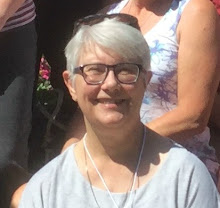There has been a bit of upheaval in the weaving community since Olds College decided to terminate their master weaver and spinner programs. I hesitated to comment, but now that the dust has settled somewhat, I thought it might be time to review what is available for teaching/testing programs.
Olds College offered a college level course that provided a certain level of basic to advanced knowledge with an emphasis on learning how to communicate that knowledge. The assumption being that, by the time a student achieved the 'master' certificate they would have a good background in the craft and would be able to teach it effectively. Or, at least, write about it, which is just a form of teaching, after all.
Many people are feeling the loss of this teaching program deeply, and it is hoped that another college will see the value in it and - if not take the program over - at least offer something similar.
In the meantime, there are other programs that weavers may find helpful.
If someone is looking for a teaching program, there is the Ontario guild. When I was looking for programs for myself back in the 1980s, I looked at the Ontario program *because* there was a teaching component. Unfortunately, I simply did not have the financial resources to travel to Ontario yearly for that teaching.
I looked at the HGA COE, but it was a lot more expensive than the GCW program, and had hard deadlines that I could not meet.
I also had a group of local weavers already taking the GCW program, and they kindly allowed me to attend their 'meetings'. I learned so much from them that I decided that was the route I would follow.
There are other guilds with similar programs to the GCW - it is my impression that the GCW program might have used the guidelines for the Boston guild as a basis for the GCW program. One of the founders of the GCW was Mary Sandin, who had, for a time, been a member of the Boston Guild. She, along with Mary Black (yes, *that* Mary Black) and Ethel Henderson formed the GCW and developed the program still in use today.
Over the years, I've marked levels for GCW and have encouraged people to follow that program. Even if there is no teaching associated with it, the research I did in order to meet the testing requirements, and the samples I was required to weave to show I knew the weave structures, expanded my knowledge enormously.
It is a self-study program, so you do have to be pretty focused about doing the work and meeting the deadlines. However, they are not 'hard and fast', but allow one to skip a year (or more) before submitting their next level. For example, my 'master' level required a lot more years than I expected, in part because of the amount of research I did, but also the weaving of the samples required to illustrate my monograph.
Do I regret it? Not one bit.
I loved teaching the Olds program, in no small part because I wound up teaching level one for most of the time and level one deals with wool and fulling. Since I have been thumping the drum about wet finishing for decades (literally, now) that level was just right up my alley. :D
The lectures I developed during Covid were directly targeted at my Olds students, especially those in the higher levels, itching to keep learning and working toward their certificate.
Honestly, if a guild hired me to just present those 11 presentations, they would get a 'master' class in weaving. (A friend told me that if it was true, it wasn't bragging...)
If I can't come to a guild physically, I can and will happily come remotely.
Topics and fees listed on my web site.
Or buy The Intentional Weaver, which was written based on questions from my Olds students...




No comments:
Post a Comment